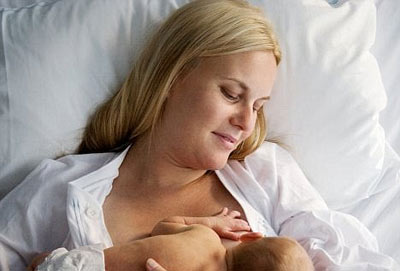|
 Breastfeeding is recommended for the first six months of a baby's life. |
|
Every mother who returns to work full-time must be allowed ‘breastfeeding breaks’ of up to two hours each day, according to the latest rules from Brussels. Under proposals being considered by MEPs, mothers would also be given the right to work part-time for a year after having a baby, and be entitled to 20 weeks’ maternity leave on full pay. The British Chambers of Commerce warned the measures could cost the Government £2.5billion, and ‘risk the position of women in the workplace’. It warned taxes would have to rise to cover the extra costs, such as hiking VAT even higher to 20.5 percent. Under the proposals, buried in Europe’s Pregnant Workers’ Directive, with which Britain would be legally obliged to comply if passed: * Every mother who returns to work full-time must be allowed ‘breastfeeding breaks’ of two hours every day. There is no cap on these breaks, which means they could continue for years if the woman decides to breastfeed beyond the traditional period. * Mothers will have an ‘a(chǎn)bsolute right’ to a flexible job and will be entitled to work part-time for up to one year after they return to work. * No boss will be able to force a woman to do a night shift or overtime in the ten weeks before her baby is born or during the breastfeeding period. * Mothers will get full pay for the first 20 weeks of maternity leave. They currently get 90 percent of their salary for six weeks, followed by £128.73 a week for the next 33 weeks. * It will also be compulsory to have at least six weeks off after giving birth, compared with two at the moment. * Fathers would see paternity pay increased to two weeks’ on full pay. At present, they receive £128.73 a week for a fortnight. British mothers returning to work can currently ask to work flexibly but a boss has the right to refuse if there is a clear business reason why it is not possible. Phil McCabe, from the Forum of Private Business, said: ‘Business do want to accommodate mothers but such extreme measures would make it increasingly difficult for small firms. They are mad. There is a risk it would put off some business owners from employing women of child-bearing age.’ (Read by Christine Mallari. Christine Mallari is a journalist at the China Daily Website.) (Agencies) |
根據(jù)位于布魯塞爾的歐盟訂立的新規(guī)定,每位休完產(chǎn)假回來全職工作的母親每天都必須有兩小時的哺乳假。 經(jīng)歐洲議會成員考慮的這些提議指出,母親們還應(yīng)享受產(chǎn)后一年內(nèi)非全日工作的權(quán)利,而且應(yīng)享受20周的全薪產(chǎn)假。 英國商會警告說,這些措施將花費政府25億資金,并將使“女性在職場中的地位陷入危險”。 商務(wù)部警告說,為了負(fù)擔(dān)額外的開支,將不得不提高稅收,例如將已經(jīng)很高的增值稅調(diào)得更高,調(diào)至20.5%。 如果這些規(guī)定通過,英國將有法律義務(wù)遵循歐洲的“懷孕工人指令”的以下條款: * 必須給予每位產(chǎn)后重回職場進行全職工作的母親每天兩小時的“哺乳假”。 休哺乳假的時間沒有上限,這意味著只要女性在傳統(tǒng)哺乳期結(jié)束后仍決定用母乳喂養(yǎng)小孩,她們就能夠連續(xù)好幾年休哺乳假。 * 母親們將擁有彈性工作時間的“絕對權(quán)”,在回歸職場后一年內(nèi)她們將能享受非全日工作的權(quán)利。 * 在孩子出生10周前和哺乳期間,任何一位上司都不能強迫女性去值夜班或加班。 * 在產(chǎn)假的頭20周內(nèi)母親們將能享受全薪待遇。目前她們在產(chǎn)假的前6周能得到90%的薪水,在隨后的33周每周的薪水是128.73英鎊。 * 在生產(chǎn)后,母親們將至少必須休6周產(chǎn)假,而目前這一強制性產(chǎn)假為2周。 * 父親們將能享受更多的產(chǎn)假工資,全薪產(chǎn)假為兩周。目前他們在兩周產(chǎn)假內(nèi)每周的薪水是128.73英鎊。 回歸職場的英國母親們現(xiàn)在可以提出彈性工作時間的請求,但是如果有明確的業(yè)務(wù)原因使其無法實現(xiàn),上司有權(quán)拒絕這一請求。 來自私營企業(yè)論壇的菲爾?麥卡比說:“企業(yè)們當(dāng)然想為母親們提供方便,但這種極端的措施會讓小公司們度日維艱。他們很惱火。出臺這些政策簡直是瘋了。而且這可能會讓一些企業(yè)主不愿雇傭育齡婦女。” 相關(guān)閱讀 (中國日報網(wǎng)英語點津 陳丹妮 編輯:馮明惠) |
|
Vocabulary: MEP: Member of the European Parliament 歐洲議會成員 entitled to: 有權(quán)享有 maternity leave: 產(chǎn)假 hike: (尤指急劇地)提高(物價等) VAT: value-added tax 增值稅 cap: <美>(經(jīng)費等的)最高限度 compulsory: 必須做的,強制性的 fortnight: 兩星期 accommodate: 給……方便;通融 put off: 阻礙 |
